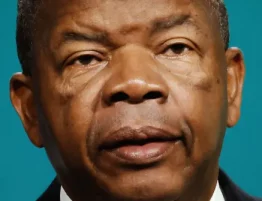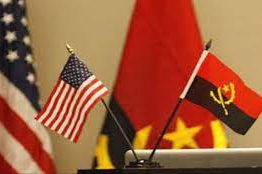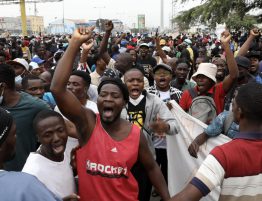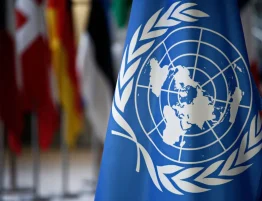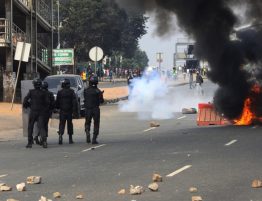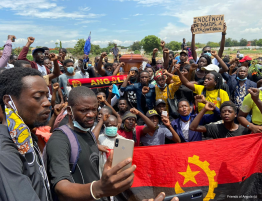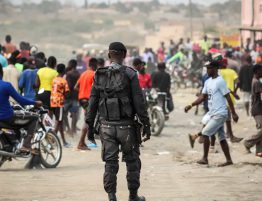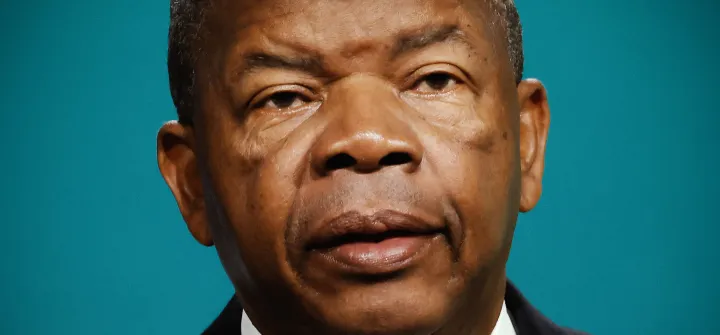
By Paula Cristina Roque and David Boio |Daily Maverick
Angola’s slide from autocracy into totalitarianism has begun with a national security law proposing draconian measures of social and civic control.
The ruling MPLA party and President João Lourenço are reinforcing the autocratic character of their political power, motivated by fear and a visceral need to stay in power. The MPLA has ruled for almost 50 years and plans on staying another 50.
The 2022 elections, likely won by the opposition but stolen by the regime through widespread irregularities, exposed the widespread political antibodies within urban poor and young people. Turning from autocratisation to totalitarianism is a mechanism of survival. Totalitarian regimes have several characteristics including an unchecked and centralised power, a monopolistic version of the nation and control over society, a repressive security apparatus and a mass communication system to indoctrinate and censor. They conflate the state, party, government, security, economy and civil society. Totalitarian states also neutralise key values of reason, dignity, individual worth, democratic processes and freedom of conscience. The national security bill is an instrument to achieve this.
On 25 January, the Angolan parliament passed a bill on national security that centralises national security matters in the presidency, allows for an internet shutdown, public and private police searches, and criminalises civilians who do not report on their fellow citizens. The bill essentially legalises what is unconstitutional and illegal. It normalises practices that were previously reserved only for times of war, crises and states of emergency, extending a type of martial law across the public and private space. Naturally without any oversight from the judiciary, parliament or civil society.
Essentially it embeds security into the national culture as a delivery system for fear, paranoia and control.
This bill brings together an existing legal and institutional infrastructure comparable to China, Russia and other repressive states like Uganda, Rwanda and Ethiopia. These last three now share a common feature with Angola: They are all close allies of the US and receive large amounts of military aid.
Read more in Daily Maverick: Angola shows how overriding democracy is America’s new realpolitik in Africa
As broad a definition as national security can be, when a democratic state employs the term, it usually refers to the defence of the sovereign state, its citizens, institutions and economy to ensure freedom, absence of fear, foreign disruption, and the preservation of the nation. In a dictatorial regime this definition becomes even more problematic given the fusion of nation, party and state. In Angola, the security of the state refers to security of the party.
Angola’s new law stipulates that a threat to national security refers to the capacity and intention, directly or indirectly, to damage national interests and objectives. Article 6 defines how the state is a promoter of a culture of national security to ensure that the population understands the values, principles and interest of security. Essentially it embeds security into the national culture as a delivery system for fear, paranoia and control.
However it is Article 36 that is truly shocking. As preventative measures, the security apparatus (police, intelligence services, military, civil defence militias and other special units) can, without warrants, search private homes and workplaces, public and private transport, can close off roads and close down establishments deemed a risk. It also implies setting up surveillance equipment in all public areas, can shutdown public or private radios and podcasts, as well as telecommunications, and deploy a full internet shutdown.
The bill also provides complete immunity for those who participate and become state informers.
Political theorist Hannah Arendt, who wrote on totalitarianism and claimed that “we are free only insofar as we exercise control over what people know about us and in what circumstances”, also highlighted that ordinary people became actors in the totalitarian system extending “the banality of evil”.
This law also makes every Angolan citizen complicit in a system of securitisation that merely exists to uphold the hegemony of a weakened president. Article 38 defines the “patriotic and civic” duty of civilians to participate and collaborate with the system. US Senator Joseph McCarthy, who drove a national witch-hunt in the 1940s and 1950s against suspected communists, would be proud. The bill also provides complete immunity for those who participate and become state informers. Any human rights defender, journalist, civil society member and opposition member can be targeted by the futility of a neighbours’ tip-off and is likely to face imprisonment and persecution.
The timing of such a bill is curious. Now that Lourenço has the full backing of Washington, he feels emboldened to take repressive measures and reverse all the hard-won democratic gains. Angola has joined the club of US military aid recipients in Africa – Rwanda, Uganda and Ethiopia – that have instrumentalised military assistance from Western donors to ensure regime stability, reconfigure power and build militarised states. They use the process of securitised aid to enhance the effectiveness of their authoritarian actions against internal dissent. They also use mass surveillance and spying to control, intimidate and repress their real or imagined enemies.
Since 2011 the US Department of Defence has provided $280-million in training and equipment to Uganda, and has spent more than $2.5-billion on supporting the African Union’s Somalia mission (Amisom) of which Uganda is the largest recipient. Between 2000 and 2020, when the War on Terror was at its peak, the US provided Ethiopia with $153-million in security aid. US support for Rwanda, although oscillating because of instability in the DRC, remains a tool that allows Kigali to build a security apparatus that spies on its adversaries and implements renditions abroad to criminally charge opponents. Like Angola, these three countries use mass surveillance to intimidate and control.
An indirect result of the national security law is the entablement of fear as a public policy. The psychology of fear alludes to a process called Pavlovian conditioning which refers to fear learning, where people learn to be afraid of new things, especially being able to identify signs of these factors that induce fear. Fear has been used for patriotic unity and national security by authoritarian and democratic governments alike. This was seen during the Cold War, the War on Terror and more recently the rise of right-wing populism and nationalist polarisation across the West. When citizens feel insecure, they seek a sense of safety which has been linked to the erosion of democracy; comfortable in giving up certain freedoms. But fear also creates impulses of cruelty in the herd mentality. Bertrand Russell aptly wrote: “Neither man nor a crowd nor a nation can be trusted to act humanely or to think sanely under the influence of great fear.”
In summary, the implementation of the National Security Law in Angola, considering its context as an authoritarian state, presents several significant political challenges, including:
- The risk of reinforcing authoritarianism (in an authoritarian state, national security laws can be used to reinforce government control over the population. There is a risk that such laws will be applied in a way that suppresses opposition and limits civil and political liberties);
- Balancing security and human rights becomes harder (a critical challenge will be to balance the need for national security with the protection of human rights. In authoritarian regimes, state security often takes precedence over individual rights, leading to possible abuses and rights violations);
- A lack of oversight and transparency (in a system with little independent oversight, the implementation of a national security law can take place without proper transparency, increasing the risk of abuses of power);
- Impact on freedom of expression and dissent (the law can be used to justify the repression of dissenting voices, limiting freedom of expression and the press, which are crucial elements of democracy);
- Creating an environment of fear and distrust (the implementation of strict security measures can create a climate of fear and distrust among citizens, damaging social cohesion and trust in institutions);
- Challenges in implementing democratic reforms (the law can become an obstacle to eventual democratisation efforts, consolidating authoritarian power structures and hindering the implementation of political and social reforms); and
- There is a risk that the law could be used as an instrument of political manipulation to eliminate opponents and strengthen the ruling party’s control). DM
Paula Cristina Roque is executive director of Intelwatch. She has served as an adviser for the Crisis Management Initiative and a senior analyst for southern Africa with the International Crisis Group. Previously, she worked with the South Sudan-Centre for Strategic and Policy Studies, the Institute for Security Studies, the South African Institute for International Affairs and as a journalist in west Africa and the UK. Paula holds a DPhil in development studies from the University of Oxford.
David Boio is an Angolan researcher and founder of Camunda News and of the academic institute Sol Nascent in Huambo. He is also a lead investigator for Ovilongwa, national partner of Afrobarometer in Angola.


